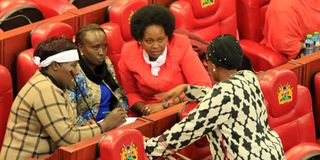The long walk to the two-thirds gender rule

Some women MPs during debate on two-thirds gender rule Bill 2018. Legislators are seeking to abolish controversial gender rule.
What you need to know:
- After three Bills on the two-thirds gender principle never saw the light of the day, women have now turned their eyes to Chief Justice David Maraga.
- In 2012, the Supreme Court tasked Parliament to pass a law effecting the principle; nothing happened.
In 2017, the High Court ordered the two houses to pass the gender principle law, they defaulted.
In April this year, an activist petitioned the Chief Justice to advise the Executive to dissolve Parliament for failing to enact the law. Last month, the Law Society of Kenya wrote to the CJ seeking the same.
With no hope in sight for neither National Assembly nor Senate to enact legislation on implementation of the two-thirds gender principle, Kenyan women have now turned their eyes to Chief Justice David Maraga.
The Supreme Court and the High Court have given direction on the matter and Bills introduced in Parliament, but little can be said about the relevant legislation 10 years since the Constitution was promulgated.
In 2012, the Supreme Court gave Parliament until August 27, 2015 to pass a law effecting the principle lest it be dissolved. Parliament extended the period to August 27, 2016. The deadline elapsed and nothing happened.
Defaulted
Later, Centre for Rights Awareness and Education (Creaw) and National Women Steering Committee sued the National Assembly and Senate for failing to enact the law.
In March 2017, the High Court ordered the two houses to pass the gender principle law within 60 days. They defaulted.
In April this year, an activist, Ms Margaret Toili, petitioned Chief Justice Maraga to advise the Executive to dissolve Parliament for failing to enact the law. Last month, the Law Society of Kenya wrote to the CJ praying for the same.
Meanwhile, three Bills on the principle never saw the light of the day.
In April 2015, the then Justice and Legal Affairs Committee chairperson Samuel Chepkong'a introduced in Parliament two bills - Constitution of Kenya (Amendment) Bill, 2015 and Two-Third Gender Rule Laws (Amendment) Bill, 2015. Both never went beyond the first reading.
Duale Bill
In July, the same year, then majority leader Mr Aden Duale introduced the Constitution of Kenya (Amendment) (No. 4) Bill, 2015 (Duale Bill) and whose progress is still stuck at the second reading.
Four times, more than 233 legislators out of the 349, would not show up to vote for the Bill to proceed to third reading, a stage where MPs could give it a nod consequent to assent by the President.
The MPs were to take a vote on the Bill in plenary sessions held in March 2016; November 2016; November 2018 and February 2019, but just a handful showed up, leading to the shelving of the Bill.
Equal plane
Duale Bill provided for special seats that would ensure the gender principal is realised in Parliament for a period of 20 years from 2017 general election.
“It is hoped that by that time, both genders will have been given a level playing field and will be able to compete on an equal plane,” reads a memorandum, arguing out reasons to have the bill.
This failure of Parliament to pass laws on two-thirds gender principle or lack of commitment to ensure enactment of the legislations has now prompted a change of tact.
“We have essentially exhausted out court options,” said Crawn Executive Director Ms Daisy Amdany.
“So now, it is to push the Chief Justice to advise the President to dissolve Parliament,” she said during an August 26, webinar on Commemoration of Katiba @10 Safeguarding the 2/3 thirds Gender Principle webinar by Crawn.
Women's exclusion
She attributed failure by Parliament to enact the legislation to lack of a punitive measure for the default.
“We need to have consequences for women’s exclusion,” she said.
“One of the biggest reasons why we have not made the kind of impact that is needed on the two-thirds gender principle is because in Kenya there has been absolutely no political cost to short-changing women,” she added.
She said women “must now organise (themselves) and take the battle to Judiciary.”
“This thing sits at the foot of the Chief justice David Maraga. He has in his hands the power to give the political cost for short-changing women,” she said.
Article 261(7) of the Constitution on consequential legislation provides that “If Parliament fails to enact legislation in accordance with an order under clause (6) (b), the Chief Justice shall advise the President to dissolve Parliament and the President shall dissolve Parliament.”
Affirmative action
Chief Justice’s decision would, however, be informed by a report from the Attorney General on steps taken to ensure that the required legislation is enacted within the period specified as ordered by the High Court, clause (6) (b) guides.
Meanwhile, a governance and gender development expert Ms Caroline Lintari argued that affirmative action has not given women access to leadership.
This is because those elected or nominated are not given a chance to make independent decisions, she said.
She said, women whether elected or nominated should carry the women agenda in Parliament.
“But the agenda is being set by a person who appointed them,” she said during the webinar.
“That is why women’s accountability to their constituents has been weak,” she said.





